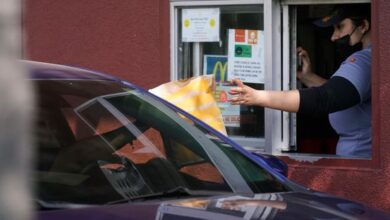New college grads are the most unemployed in today’s job market

Despite a surprisingly robust job market, recent college graduates have been having a harder time finding work than the rest of the population since the pandemic. This marks a sharp reversal from long-held norms, when a newly-minted college degree all but guaranteed a better shot at employment. Since 1990, the unemployment rate for recent grads almost always has been lower than for the general population.
But that changed after covid. New grads have consistently fared worse than other jobseekers since January 2021, and that gap has only widened in recent months. The latest unemployment rate for recent graduates, at 4.4 percent, is higher than the overall joblessness rate and nearly double the rate for all workers with a college degree, according to an analysis by the Federal Reserve Bank of New York.
Part of the problem is that the industries with the biggest worker shortages — including restaurants, hotels, day cares and nursing homes — aren’t necessarily where recent graduates want to work. Meanwhile, the industries where they do want to work — tech, consulting, finance, media — are announcing layoffs and rethinking hiring plans.
“Recent college graduates are very sensitive to the state of the labor market,” said Harry Holzer, a public policy professor at Georgetown University and former Labor Department chief economist. “There’s been some softening in hiring, and young people in general are the first to feel it.”
The result is yet another disruption for a generation of college graduates who have already had crucial years of schooling upended by the pandemic. In interviews, many said they’d struggled to adjust to remote-learning in early 2020 and felt like they had missed out on opportunities to forge connections with professors, employers and other students that could have been crucial in lining up for postgraduate work. Now, as they enter the workforce, they say they’re feeling increasingly disillusioned about the economy, which is fueling political discontent and causing them to rethink the financial independence they thought they’d achieve after college.
“It’s been really difficult,” said Christian Torres, 24, who graduated this spring with an electrical engineering degree from Arizona State University and is still looking for work. “Even the entry-level engineering jobs want four or five years of experience. There’s no way to compete, so I’m still living at home, still looking for work.”
More than half — about 55 percent — of young adults lived with their parents last year, down from pandemic-era peaks but higher than in 2019, census data shows. A combination of a softening job market, ballooning student debt and lingering inflation have forced many to rethink their post-graduation living arrangements.
In California, Chung recently took the only job he could find, as a front-desk attendant for a hotel. He makes $19.20 an hour, more than the minimum wage but too little to live on in Sonoma County. He can’t afford to move out of his parents’ home and is still applying for work, though the rejections keep mounting, even for positions he feels overqualified for, such as receptionist or car rental agent.
The share of recent graduates who, like Chung, are underemployed — or working in jobs that typically do not require a college degree — has picked up this year, from 38 percent to 40 percent, according to the New York Fed. By comparison, the share of all college graduates considered underemployed has remained steady at 33 percent.
That souring outlook is fueling broader discontent among young Americans, who are disproportionately focused on economic issues such as jobs, taxes and the cost of living, according to a recent New York Times-Siena College poll. A stunning 93 percent of young adults in battleground states said the economy was fair or poor, compared with 81 percent of the overall population, the poll showed. Meanwhile less than 1 percent of adults between 18 and 29 rated the economy as “excellent,” the lowest of any age group.
Those grievances could create new challenges for President Biden as he seeks reelection next year. Although 60 percent of young adults voted for Biden in the 2020, the highest share of any age group, that support appears to be waning.
“College graduates are used to having it pretty good and getting much higher earnings, much lower unemployment,” said Holzer of Georgetown. “They had high expectations, and you can understand why they might feel disappointed if they’re experiencing difficulty finding a job.”
College officials nationwide say companies are still recruiting with gusto at campus job fairs and other events. But there are also signs of a slowdown in actual hiring, particularly by big tech firms and consulting companies that have long been popular destinations for graduating seniors.
“Employer engagement is still very high but at the same time, we’re seeing an uptick in students expressing frustration with their job searches,” said Suzanne Helbig, associate vice provost of the University of California Irvine’s division of career pathways. “It’s become more difficult to land interviews, and not as many students are coming to us with job offers.”
Similarly, at Michigan State University, the share of undergraduate students securing full-time jobs within six months of graduation fell last year, to 56 percent from 62 percent the year before. More students also reported taking on part-time work and searching for employment than in 2021.
Kyle Ciambrone, who lives in New Jersey, graduated with a marketing degree from Monmouth University in 2020 just as the world was shutting down. His options were limited, so he took a job delivering pizzas, then another one processing returns at a warehouse.
Since then he’s applied to as many as 50 office jobs a week but has yet to find something long-term.
“I always just expected that you’d go to school, get your degree and end up working some sort of office job that pays enough to live on,” Ciambrone, 25, said. “That’s the way it worked for my dad and my brother, who’s 10 years older than me. But that doesn’t seem possible anymore.”
The issue, some economists say, is not so much that recent college graduates are falling behind. Instead, workers without degrees are finally getting a leg up. Demand for workers has been brisk in industries like leisure and hospitality, child care and manufacturing, which typically don’t require a college degree. Construction postings on the jobs site Indeed, for example, are up 50 percent from pre-pandemic levels, while software development and marketing openings have fallen about 20 to 25 percent.
“The labor market is tougher if you’re a recent grad, but this is really a story about how the job market has been really good for people without a degree,” said Kory Kantenga, senior economist at LinkedIn.
There are other dynamics at play, too. Recent graduates — who spent months, if not years, learning virtually during the pandemic — are increasingly looking for hybrid and remote work arrangements, which means competing with a large swath of applicants around the country. They are also losing out to newly-laid off tech and media workers with real-world experience, according to Julia Pollak, chief economist at ZipRecruiter.
The slowing economy is also playing a role. The Federal Reserve has been aggressively raising interest rates in hopes of bringing down inflation, which has brought the real estate market to a standstill and raised borrowing costs for all types of businesses.
“There’s tremendous uncertainty in tech and banking — companies aren’t going public, there are very few mergers,” Pollak said “These companies — all destinations for college grads — are being very cautious, very cost-conscious at the moment. And until that dynamic turns around, these younger, less-experienced workers are going to be the ones who are marginalized and stuck on the sidelines.”
In Pennsylvania, Amber was finishing her junior year at a liberal arts college when covid forced everyone to go home. She welcomed the change at first — she’s introverted, she said, and felt more comfortable attending classes remotely. But now she wonders if there were drawbacks, too.
“It was hard to use my resources and connect with people,” said Amber, 25, who spoke on the condition that The Post identify her by her first name for fear of putting off potential employers. “I’m a really shy person and that was even harder to do from home. I should’ve gone to the employment office, I should’ve made more connections.”
Amber graduated with a physics degree in 2021 and took a job making $10 an hour at a call center. She quit a year later because of frequent harassment, figuring she could easily find another job.
That hasn’t been the case: After a year and half of searching for jobs in engineering, customer service, tutoring and IT, she’s still struggling to get an offer. Amber estimates she’s sent out more than 1,000 applications on Indeed.com. She’s been covering rent by posting photos and videos on OnlyFans, the digital subscription service for online creators.
“Forget finding work that makes me happy or fulfilled,” Amber said.“At this point, I’m just trying to do anything that will help me pay rent. It feels demoralizing.”
Meanwhile, Chung, who’s working at a hotel in California, has begun cold-calling law firms looking for work. He’s also started studying for the LSAT. Maybe, he says, he’ll just go to law school.
“I had a bit of a feeling it’d be hard to find a job,” he said. “But I didn’t expect it to be this bad.”





